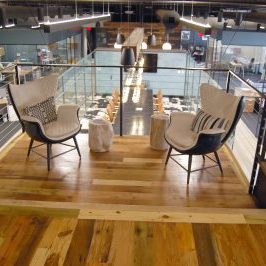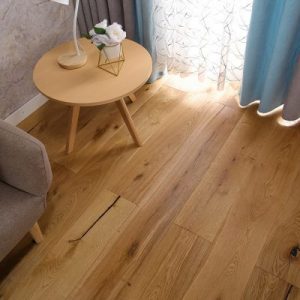Bamboo flooring is a type of natural flooring material made from bamboo, a fast-growing and renewable plant. It offers several unique features that make it a popular choice among homeowners. Here are some of the key features of bamboo flooring:
- Sustainability: Bamboo is an eco-friendly option due to its rapid growth rate. It can reach maturity in just a few years, making it a highly renewable resource. This contrasts with traditional hardwood trees, which can take decades to mature.
- Strength and Durability: Bamboo is known for its exceptional strength, often rivaling hardwoods like oak or maple. Strand-woven bamboo, in particular, is engineered to be even stronger than traditional bamboo flooring, making it highly durable and resistant to dents and scratches.
- Variety of Styles: Bamboo flooring comes in various styles, colors, and finishes, providing a wide range of options to match different interior design preferences. It can mimic the appearance of hardwood or offer a unique, contemporary look.
- Natural Aesthetic: Bamboo flooring maintains a natural and warm aesthetic that can add a touch of elegance to any room. Its grain patterns and color variations contribute to its visual appeal.
- Easy Maintenance: Bamboo flooring is relatively easy to clean and maintain. Regular sweeping or vacuuming, along with occasional mopping, is usually sufficient to keep it looking clean. It’s important to avoid excessive moisture, as bamboo is more susceptible to water damage than some other flooring types.
- Moisture Resistance (Strand-Woven Bamboo): Strand-woven bamboo, which is made by compressing bamboo fibers together with adhesives, offers improved moisture resistance compared to traditional bamboo. This makes it suitable for areas with slightly higher humidity levels.
- Hypoallergenic: Bamboo flooring is naturally resistant to dust and allergens, making it a good choice for individuals with allergies or sensitivities.
- Installation Options: Bamboo flooring is available in various installation formats, including tongue-and-groove planks, click-lock systems, and even bamboo tiles. This allows for different installation methods depending on your skill level and preferences.
- Renewable and Biodegradable: Beyond being a renewable resource, bamboo is biodegradable, which means that when the flooring eventually reaches the end of its lifespan, it won’t contribute to long-lasting waste in landfills.
- Cost-Effective Alternative: Bamboo flooring often comes at a lower cost compared to traditional hardwood flooring options, making it an attractive choice for budget-conscious homeowners.
- Unique Look: Depending on the type of bamboo used and the manufacturing process, bamboo flooring can have a distinctive appearance, with characteristic knots and patterns that set it apart from other flooring materials.
While bamboo flooring offers many benefits, it’s important to note that the quality can vary among different manufacturers and products. Thorough research, choosing a reputable brand, and proper installation and maintenance will ensure that your bamboo flooring serves you well for years to come.















